The expanded definition of practice in contemporary art now encompasses forms of direct political engagement, collaboration, social activity and public performance. How do these often temporary actions and alliances relate to the understanding, practice and education of art in Pakistan?
Today, artistic practice in South Asia is centred around art schools based in metropolitan cities; these spaces provide a generative site for artistic production. Meanwhile, public investment in cultural institutions has been inconsistent with the professionalisation and educational investment in art and design. Ideological shifts and limited institutional support constrain the fields of academic research and art historical scholarship.
With the recent arrival of the biennial exhibition, new funding mechanisms are emerging, changing the social and political landscape within which artists live and work. How are both artists and academics responding to the confluence of critical practice and private financial interests now driving cultural projects in cities such as Karachi? How does the biennial identify and address its audience, and how is the site of the exhibition understood as a dialogic or discursive space? How might we place recent developments against the histories of art practice and exhibition making in South Asia?
This seminar, in combining academic research, politics and visual culture in the contemporary art world, aims to explore new geographical and cultural formations from which to advance the decolonial project, and to experiment with models of critical pedagogy that move beyond conventional art school and exhibition formats.
Further information
The Karachi Seminar is organised by Tate Research Centre: Asia in partnership with Habib University and the British Council with support from the Lahore Biennale Foundation. Tate Research Centre: Asia has been generously supported by the Andrew W. Mellon Foundation.

